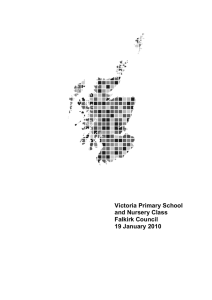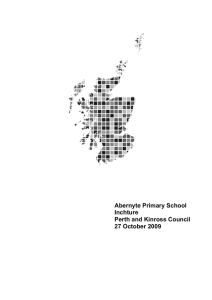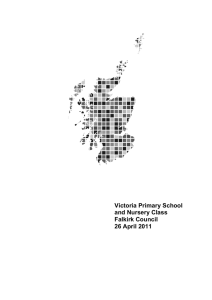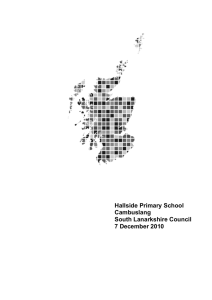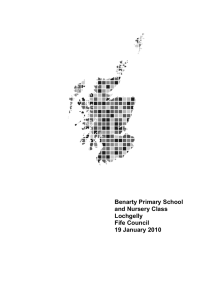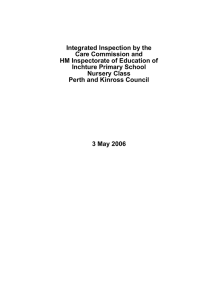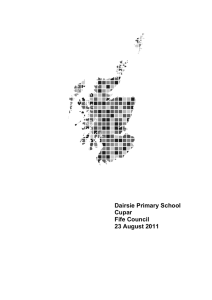Integrated Inspection by the Care Commission and HM Inspectorate of Education of
advertisement
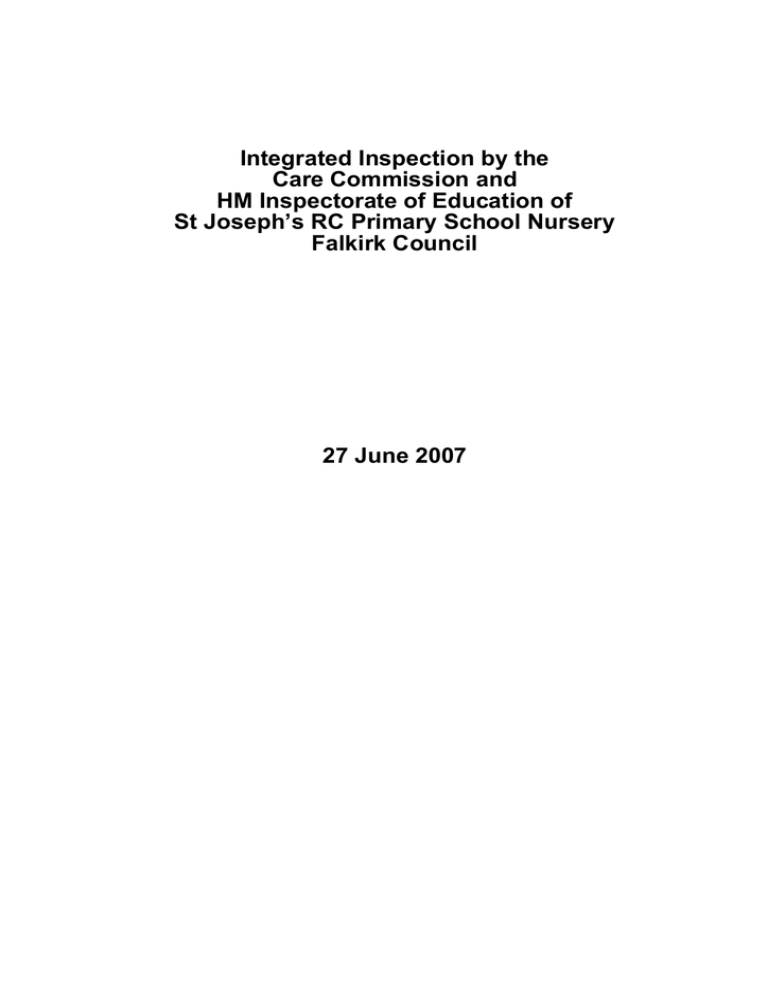
Integrated Inspection by the Care Commission and HM Inspectorate of Education of St Joseph’s RC Primary School Nursery Falkirk Council 27 June 2007 St Joseph’s RC Primary School Nursery Broomhill Road Bonnybridge FK4 2AN The Regulation of Care (Scotland) Act, 2001, requires that the Care Commission inspect all care services covered by the Act every year to monitor the quality of care provided. In accordance with the Act, the Care Commission and HM Inspectorate of Education carry out integrated inspections of the quality of care and education. In doing this, inspection teams take account of National Care Standards, Early Education and Childcare up to the age of 16, and The Child at the Centre. The following standards and related quality indicators were used in the recent inspection. National Care Standard Child at the Centre Quality Indicator Standard 2 – A Safe Environment Resources Standard 4 – Engaging with Children Development and learning through play Standard 5 – Quality of Experience Curriculum Children’s development and learning Support for children and families Standard 6 – Support and Development Standard 14 – Well-managed Service Management, Leadership and Quality Assurance Evaluations made using HMIE quality indicators use the following scale, and these words are used in the report to describe the team’s judgements: Very good Good Fair Unsatisfactory : : : : major strengths strengths outweigh weaknesses some important weaknesses major weaknesses Reports contain Recommendations which are intended to support improvements in the quality of service. Any Requirements refer to actions which must be taken by service providers to ensure that regulations are met and there is compliance with relevant legislation. In these cases the regulation(s) to which requirements refer will be noted clearly and timescales given. HOW TO CONTACT US If you would like an additional copy of this report Copies of this report have been sent to the headteacher, staff and the education authority. Copies are also available on the Care Commission website: www.carecommission.com and HMIE website: www.hmie.gov.uk. Should you wish to comment on any aspect of integrated pre-school inspections, you should write in the first instance to Kenneth Muir, HMCI, at HM Inspectorate of Education, Denholm House, Almondvale Business Park, Almondvale Way, Livingston EH54 6GA. Our complaints procedure If you have a concern about this report, you should write in the first instance to either: Complaints Coordinator Headquarters Care Commission Compass House Riverside Drive Dundee DD1 4NY Hazel Dewart HM Inspectorate of Education Denholm House Almondvale Business Park Almondvale Way Livingston EH54 6GA If you are not satisfied with the action we have taken at the end of our complaints procedure, you can raise your complaint with the Scottish Public Services Ombudsman. The Scottish Public Services Ombudsman is fully independent and has powers to investigate complaints about Government departments and agencies. You should write to The Scottish Public Services Ombudsman, Freepost EH641, Edinburgh EH3 0BR. You can also telephone 0800 377 7330 (fax 0800 377 7331) or e-mail ask@spso.org.uk. More information about the Ombudsman’s office can be obtained from the website: www.spso.org.uk. A copy of the HMIE complaints procedure is available from the HMIE website at www.hmie.gov.uk or by telephoning 01506 600 258. Crown Copyright 2007 Care Commission HM Inspectorate of Education This report may be reproduced in whole or in part, except for commercial purposes or in connection with a prospectus or advertisement, provided that the source and date thereof are stated. _______________________________ Integrated Inspection by the Care Commission and HM Inspectorate of Education of St Joseph’s RC Primary School Nursery Falkirk Council Introduction St Joseph’s RC Primary School Nursery was inspected in March 2007 as part of the integrated inspection programme by the Care Commission and HM Inspectorate of Education. HMIE carried out the inspection on behalf of both organisations and consulted the Care Commission about its findings. An inspection of the primary school was carried out at the same time by HMIE and is the subject of a separate report. The nursery catered for pre-school children aged three to five years. It was registered for 20 children attending at any one session. At the time of the inspection the total roll was 31. The environment Standard 2 The accommodation for children was bright and welcoming. Staff had created an attractive, well-organised learning environment with very good resources to support children’s development and progress. They had made interesting low-level displays for children to explore and investigate and children’s work was displayed well throughout the nursery. The interesting outdoor area could be accessed from the playroom, and staff used this very effectively to extend children’s learning. Parents, staff and children had created a wildlife garden that children used to understand and appreciate the natural world. Quality of children’s experience Standard 4 & 5 Staff knew children very well and were responsive to their individual needs. They were very respectful of children, consulted with them and valued their contributions. Children were confident and enthusiastic and were very good at making choices and decisions. Staff made very good use of dialogue, discussion and questions to extend children’s learning and to encourage them to think for themselves. They used praise appropriately to celebrate children’s efforts and achievements, and to develop their self esteem. Daily activities were well organised and planned. Staff were developing their planning to make it responsive to children’s interests and concerns. They made observations of children’s play and noted their responses. Information was used to evaluate children’s learning and to compile individual assessment documents. Staff now needed to strengthen the link between assessment information and planning to identify next steps in learning for individual children clearly. Parents received information about their children’s progress in informal and more formal meetings and in written reports. 1 Features of the programmes for children included the following. 2 • The programme for emotional, personal and social development was very good. Children were happy and cheerful in the nursery environment and were developing their confidence and self esteem. They had settled well into nursery routines and were comfortable with simple rules. Staff involved them in making plans and decisions, and children were able to choose activities confidently by themselves. They were enthusiastic learners who were developing very good skills for working together independently and in a small group. Children demonstrated independence and sustained their concentration well. Staff encouraged them to take responsibility for personal tasks such as hand washing before snack. They also took responsibility for looking after toys and equipment and tidied away after activities. • The programme for communication and language was very good. Children were confident when talking and listening to adults and to each other. Staff gave children time to formulate and express their thoughts and ideas. They were encouraged to ask questions and used language well to describe events and experiences. Children listened to information carefully and followed instructions during activities in the gym hall. Staff made very good use of labels and captions around the playroom to help children to gain an understanding of the link between the written and spoken word. Children used the book area independently and enjoyed listening to stories and finding information from books. Staff had developed ‘story sacks’ for children to take home. The writing area was used regularly by children who were very interested in writing. They could recognise their own name in print and had suitable opportunities to write it. • The programme for knowledge and understanding of the world was very good. Staff planned an interesting range of topics throughout the year. They made very good use of the wildlife garden and the local area and children were developing their wonder and appreciation of the natural environment. Children had effective opportunities to learn about their own and other cultures through the celebration of a variety of festivals. They were developing simple science and investigative skills by using a wide range of materials including water, sand and play dough. Staff encouraged children to develop their observation skills both in the playroom and outdoors. Children were developing early skills in recognising colours, shapes and numbers. Staff provided very good opportunities for children to understand simple mathematical processes such as counting, sorting, matching and measuring. • The programme for expressive and aesthetic development was very good. Staff provided opportunities for children to paint and express themselves using a range of media and techniques. Children enjoyed drawing, painting and model making. Children enjoyed inventing situations and using their imagination in role-play in the home corner. They were able to explore and investigate a variety of musical instruments and the different sounds they made. Children enjoyed singing familiar songs and rhymes and tapping out the beat. Staff encouraged children’s interest in music and provided opportunities to listen to different types of music and make their own. • The programme for physical development and movement was very good. Staff had developed a range of physical play experiences to encourage children to explore what their bodies were able to do. They had access to very good equipment to extend and encourage children’s physical skills. Children were able to run, jump, hop and skip and use a range of wheeled toys outdoors. They were cooperative in physical play and gaining a very good awareness of space and safe practices in energetic physical activity. The programme was planned by staff to ensure progression and challenge for all children. Staff provided very good opportunities for children to develop their hand and finger control through the use of a range of items including scissors, writing tools, puzzles and construction toys. Staff encouraged children to taste a variety of healthy foods and talked to them about how to keep themselves fit. Support for children and families Standard 6 The staff had created a happy, caring environment where children and parents were very welcome. They worked effectively with families to provide good support to children. Staff were committed to the involvement of parents in their children’s learning and development and in the life of the nursery. Staff kept parents well informed through the notice board, handbook, newsletters and photographs depicting life within the playroom. Parents who responded to the pre-inspection questionnaire were happy with the quality of care and education provided for their children. The nursery had a well-planned programme of induction for children moving into the primary school. Information in assessment documents was exchanged and children were familiar with the school and P1 staff. Some links had been established with outside agencies and assistance could be accessed when required. Management Standard 14 The overall management of the nursery was good. The headteacher was approachable, open and supportive of the nursery as an integral part of the school. She fostered good teamwork between the teacher and the early years practitioners. However, the role of the principal teacher who had responsibility for the nursery was not defined clearly. The principal teacher needed to continue to develop further all aspects of her responsibilities in relation the leadership and management of the nursery class. Child protection guidelines were followed appropriately and staff were aware of their duties in keeping children safe. Staff were highly motivated and committed to the further development of the nursery. The headteacher had carried out staff development and review meetings that helped to identify staff training needs. Staff 3 were aware of the Scottish Social Services Council Codes of Practice and their implications. An audit of the work of the nursery had been carried out and priorities for improvement had been identified within the development plan. However, monitoring of practice within the playroom was irregular, and the information gathered was not used effectively to support staff and evaluate the overall quality of children’s experiences within the playroom. Key strengths • The attractive learning environment in the playroom, outdoor area and wildlife garden. • Children who were very enthusiastic in their learning. • The very good quality of staff/child interaction. • The five very good programmes. • The effective teamwork and commitment of the nursery staff. Other Issues Response to recommendations or to requirements made at previous inspection At the last Care Commission singleton inspection there were no recommendations or requirements. Recommendations for improvement 4 • The principal teacher should further develop all aspects of her role in relation to the nursery. • The headteacher should continue to develop systematic and robust procedures for monitoring and evaluating all aspects of the work of the nursery. Care Commission Officers and HM Inspectors have asked the pre-school centre and education authority to prepare an action plan indicating how they will address the main findings of the report. Where requirements are made, the action plan should include timescales to deal with these. The plan will be available to parents and carers. In liaison with the pre-school centre and education authority, Care Commission Officers and HM Inspectors will monitor progress to ensure improvements are in line with the main findings of the report. Hilary Long HM Inspectorate of Education 5

